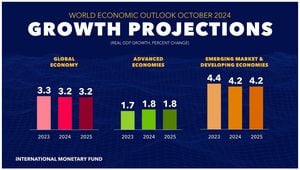The conflict between Ukraine and Russia has entered its third year, and Ukraine is ramping up its diplomatic efforts to seek a resolution. Foreign Minister Andriy Sibiga recently stated during the forum "Ukraine. Year 2025" the pressing goal to achieve comprehensive peace by the end of this year.
On the current state of the Ukrainian struggle against Russian aggression, Sibiga emphasized, "On the third year of Russian aggression, we really have the chance to end the war, though this path is complicated." This optimism reflects a broader sentiment within the country, where the population is predominantly against any negotiations to halt the war without Ukraine's direct involvement. Recent surveys indicate eight out of ten Ukrainians resent the idea of the U.S. and Russia negotiating terms without including their voice.
Continuing his insights, Sibiga urged for heightened diplomatic activity, stating, "Today is the time to buckle our diplomatic seatbelts. We must not brood over emotions; we must act clearly and coordinated." His remarks underline the necessity for focused international engagement as Ukraine navigates what he has labeled as turbulent times.
Contrastingly, the perspective from the Russian side was articulated by Father Dmitry Vasilenkov, the chief military priest overseeing operations within the conflict zone. Vasilenkov expressed skepticism about the viability of negotiations, noting, "There is no need to harbor illusions about negotiations." He outlined the steadfast belief among Russian authorities of being under serious threat from opposition forces aimed at dismantling Russian cultural and moral frameworks.
"Our opponents are intent on our destruction as the stronghold of moral and traditional values," he added, indicating the deep-seated convictions shaping the narrative of the conflict from the Russian perspective.
The juxtaposition of these views highlights the persistent tensions within potential dialogue. Vasilenkov's thoughts signal significant reluctance within Russian ranks to view negotiations as fruitful under the current circumstances. He argued for the necessity of strength and collective resilience, stating, "The solution to our problems is only possible with the active involvement of every citizen. Our task is to execute our duties—military personnel fight, civilians must help the front where they can."
Where Sibiga advocates for concerted international diplomacy to find peace, Vasilenkov stresses the values of fortitude and moral duty within their battle against external pressure. Each narrative adds layers to the complexity of achieving tranquility as both nations grapple with deeply rooted beliefs and historical grievances.
Moving forward, the stark divide between the Ukrainian and Russian outlooks reflects not only their war strategies but also encapsulates the sentiments held by their respective populations. It remains to be seen whether diplomacy will find traction or if entrenched positions will continue to dominate the discourse, potentially prolonging the conflict.
For Ukraine, the aspiration to conclude the conflict with dignity, as reflected by statements made by government officials, seeks to navigate the turbulent waters of international relations and public sentiment. The recent comments from both sides epitomize the challenges facing leaders who must balance national pride, moral duty, and the yearning for peace amid prolonged unrest.



